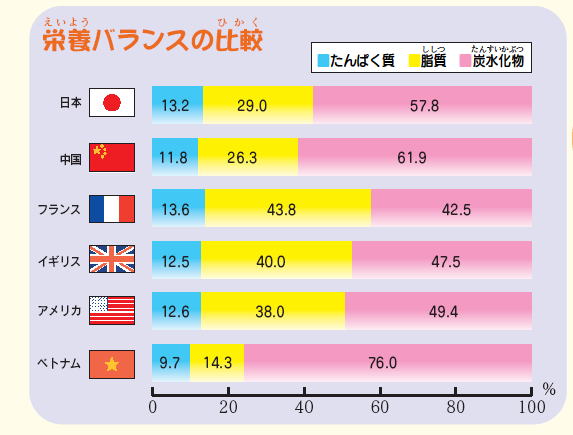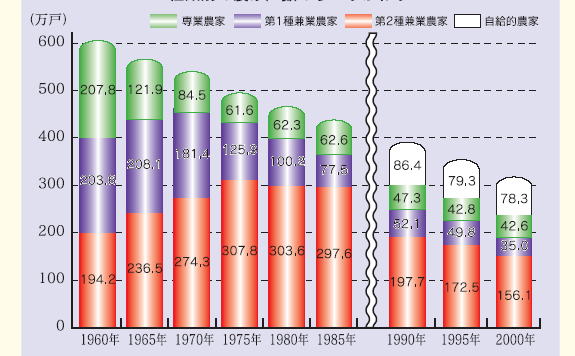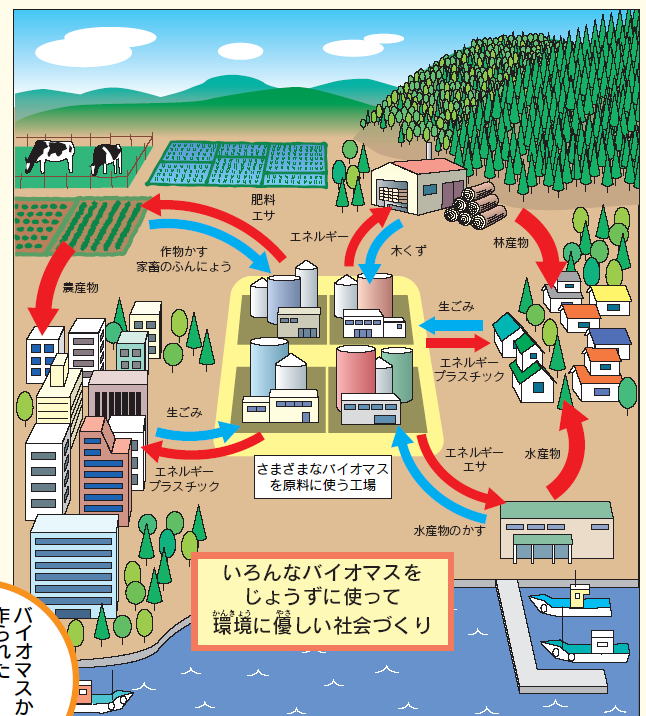4. Food Industry in Japan
@23/Mar/2005
RSS Eurasia Club/JICA SV in RSS Amman Jordan
[Purposes] [Coordinator Office] [Schedule] [Materials] [Top]
1. Abstract
Japanese foods are considered world famous healthy and rich in appearing of eye catching,
as well as highly developed deep in art form. Especially Japanese are known as paradoxical fish lover.
On the other hand, the dining table of Japanese home is dangerously reply on imported foods. Even Japan is totally surrounded by sea,
she import large amount of fish from all over the world. Surprisingly,
over 60 percents of all foods consumed in Japan are imported from North America, Asia, Australia and many other countries.
Japan is seriously seeking to increase the percentage of self reliance of their food supply domestically promoting agriculture for younger generations.

Fig.1Food supply of Japan is dangerously rely over 60 % on import from abroad

USA, Australia, Brazil are the major supplier of the basic foods ofJapan badly needed
Fig.2 Origin of countries of Wheat, Beef and Soya Beans consumed in Japan
2. Japanese Foods:
Japanese foods have enjoying good reputation as most healthy among the
world. Its main features are low fat, low calories and well balanced. Thanks
to the facts that life expectancies of Japanese people unbeatable top for
decades. Recently, a boom of Japanese foods are rushing in many western
cities like New York, Paris, London and in Amman as well. You will find
fabulously furnished Japanese restaurant in Royal hotel or Fame in 5th
circle. There is no argument that the Japanese foods are so good for our
body and nutrition. wise as well. Only we do not like is the cost of dishes,
it is also fabulously tagged.

Fig.3 Comparison on Nutrition Balance of Foods in different countries
67
3. Foods supply in Japan:
Presently, Japan is in great danger of its food supply. Surprisingly over
60% of the food consumption is relied on import from abroad. This is one
of Japan's great and serious headaches on indispensable necessities, energy
natural resources and foods. If one day import of foods stopped, it is
certain that we drop into the real starve in short period. North America,
Asia and Australia are major suppliers of our badly needed foods materials.
This vulnerable condition of food supply in Japan has been accelerated
by post war industrial shift from agriculture/fishing industries to heavy
and high tech industry. People, specially younger generation, left agriculture/fishing
industries and has engaged in industrial work which gave them higher income
than doing agriculture/fishing. Many farm lands abandoned and soon become
unproductive land anymore. And, less people has been engaged in fishing
industry as well.

Fig.4 Number of Farmers in category
On the other hand, from consumer side, demand for safer foods are increasing, and becoming to attentive more on the origin of our foods available in the supermarket. They are becoming to buy safer and higher quality of foods even its price is higher than others.
68
4. Measures taken to curve the situation:
Japanese government has now realized this serious situation on our food
supply that dangerously standing on its edge to the devastating total corruption.
They are promoting younger people to engage more in agriculture/fishing
industries giving them incentives and social statuses. Advertise of the
safety and quality of the domestic farm/fish products to the nation has
been put in priority.
Education in primary school:
Importance of domestic agriculture industry and safe supply of foods is
taught for school age children to understand the real situation of our
food issue and provide them knowledge for safer foods.
Promotion of Agriculture:
Incentives are given to the newly engaged farmers who once engaged in other
occupation in order to increase percentage of self reliance on our own
foods.
Traceability:
IC tag are going to be introduced in order to identify all the records
of food products down to the name of individual producer, and how the products
processed and stored to deliver safer and higher quality food products
to the home.
Biomass:
Recycling all wastes from farmlands, houses, factories and etc. organically
to increase total energy efficiency and keep the better global environment.

Fig.5 Conceptual model of Biomass Circle
69
5. Conclusion
Currently Japan is enjoying good standard of food supply having imported
as much as 60% of its own demand from abroad. But it is urged to improve
this dangerous situation by promoting domestic farming and fishing industries
to increase their outputs and to become attractive as other industries
are.
|
[Purposes] [Coordinator Office] [Schedule] [Materials] [Top] |
70